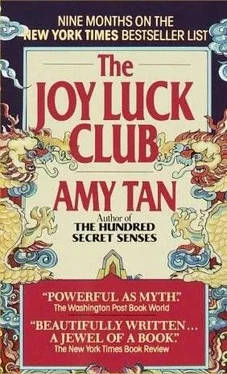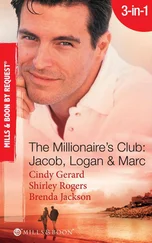I saw a girl complaining that the pain of not being seen was unbearable. I saw the mother lying in bed in her long flowing robes. Then the girl pulled out a sharp sword and told her mother, "Then you must die the death of a thousand cuts. It is the only way to save you."
The mother accepted this and closed her eyes. The sword came down and sliced back and forth, up and down, whish! whish! whish! And the mother screamed and shouted, cried out in terror and pain. But when she opened her eyes, she saw no blood, no shredded flesh.
The girl said, "Do you see now?"
The mother nodded: "Now I have perfect understanding. I have already experienced the worst. After this, there is no worst possible thing."
And the daughter said, "Now you must come back, to the other side. Then you can see why you were wrong."
And the girl grabbed her mother's hand and pulled her through the wall.
Rose Hsu Jordan
As proof of her faith, my mother used to carry a small leatherette Bible when she went to the First Chinese Baptist Church every Sunday. But later, after my mother lost her faith in God, that leatherette Bible wound up wedged under a too-short table leg, a way for her to correct the imbalances of life. It's been there for over twenty years.
My mother pretends that Bible isn't there. Whenever anyone asks her what it's doing there, she says, a little too loudly, "Oh, this? I forgot." But I know she sees it. My mother is not the best housekeeper in the world, and after all these years that Bible is still clean white.
Tonight I'm watching my mother sweep under the same kitchen table, something she does every night after dinner. She gently pokes her broom around the table leg propped up by the Bible. I watch her, sweep after sweep, waiting for the right moment to tell her about Ted and me, that we're getting divorced. When I tell her, I know she's going to say, "This cannot be."
And when I say that it is certainly true, that our marriage is over, I know what else she will say: "Then you must save it."
And even though I know it's hopeless-there's absolutely nothing left to save-I'm afraid if I tell her that, she'll still persuade me to try.
I think it's ironic that my mother wants me to fight the divorce. Seventeen years ago she was chagrined when I started dating Ted. My older sisters had dated only Chinese boys from church before getting married.
Ted and I met in a politics of ecology class when he leaned over and offered to pay me two dollars for the last week's notes. I refused the money and accepted a cup of coffee instead. This was during my second semester at UC Berkeley, where I had enrolled as a liberal arts major and later changed to fine arts. Ted was in his third year in pre-med, his choice, he told me, ever since he dissected a fetal pig in the sixth grade.
I have to admit that what I initially found attractive in Ted were precisely the things that made him different from my brothers and the Chinese boys I had dated: his brashness; the assuredness in which he asked for things and expected to get them; his opinionated manner; his angular face and lanky body; the thickness of his arms; the fact that his parents immigrated from Tarrytown, New York, not Tientsin, China.
My mother must have noticed these same differences after Ted picked me up one evening at my parents' house. When I returned home, my mother was still up, watching television.
"He is American," warned my mother, as if I had been too blind to notice. A waigoren ."
"I'm American too," I said. "And it's not as if I'm going to marry him or something."
Mrs. Jordan also had a few words to say. Ted had casually invited me to a family picnic, the annual clan reunion held by the polo fields in Golden Gate Park. Although we had dated only a few times in the last month-and certainly had never slept together, since both of us lived at home-Ted introduced me to all his relatives as his girlfriend, which, until then, I didn't know I was.
Later, when Ted and his father went off to play volleyball with the others, his mother took my hand, and we started walking along the grass, away from the crowd. She squeezed my palm warmly but never seemed to look at me.
"I'm so glad to meet you finally ," Mrs. Jordan said. I wanted to tell her I wasn't really Ted's girlfriend, but she went on. "I think it's nice that you and Ted are having such a lot of fun together. So I hope you won't misunderstand what I have to say."
And then she spoke quietly about Ted's future, his need to concentrate on his medical studies, why it would be years before he could even think about marriage. She assured me she had nothing whatsoever against minorities; she and her husband, who owned a chain of office-supply stores, personally knew many fine people who were Oriental, Spanish, and even black. But Ted was going to be in one of those professions where he would be judged by a different standard, by patients and other doctors who might not be as understanding as the Jordans were. She said it was so unfortunate the way the rest of the world was, how unpopular the Vietnam War was.
"Mrs. Jordan, I am not Vietnamese," I said softly, even though I was on the verge of shouting. "And I have no intention of marrying your son."
When Ted drove me home that day, I told him I couldn't see him anymore. When he asked me why, I shrugged. When he pressed me, I told him what his mother had said, verbatim, without comment.
"And you're just going to sit there! Let my mother decide what's right?" he shouted, as if I were a co-conspirator who had turned traitor. I was touched that Ted was so upset.
"What should we do?" I asked, and I had a pained feeling I thought was the beginning of love.
In those early months, we clung to each other with a rather silly desperation, because, in spite of anything my mother or Mrs. Jordan could say, there was nothing that really prevented us from seeing one another. With imagined tragedy hovering over us, we became inseparable, two halves creating the whole: yin and yang. I was victim to his hero. I was always in danger and he was always rescuing me. I would fall and he would lift me up. It was exhilarating and draining. The emotional effect of saving and being saved was addicting to both of us. And that, as much as anything we ever did in bed, was how we made love to each other: conjoined where my weaknesses needed protection.
"What should we do?" I continued to ask him. And within a year of our first meeting we were living together. The month before Ted started medical school at UCSF we were married in the Episcopal church, and Mrs. Jordan sat in the front pew, crying as was expected of the groom's mother. When Ted finished his residency in dermatology, we bought a run-down three-story Victorian with a large garden in Ashbury Heights. Ted helped me set up a studio downstairs so I could take in work as a free-lance production assistant for graphic artists.
Over the years, Ted decided where we went on vacation. He decided what new furniture we should buy. He decided we should wait until we moved into a better neighborhood before having children. We used to discuss some of these matters, but we both knew the question would boil down to my saying, "Ted, you decide." After a while, there were no more discussions. Ted simply decided. And I never thought of objecting. I preferred to ignore the world around me, obsessing only over what was in front of me: my T-square, my X-acto knife, my blue pencil.
But last year Ted's feelings about what he called "decision and responsibility" changed. A new patient had come to him asking what she could do about the spidery veins on her cheeks. And when he told her he could suck the red veins out and make her beautiful again, she believed him. But instead, he accidentally sucked a nerve out, and the left side of her smile fell down and she sued him.
Читать дальше












